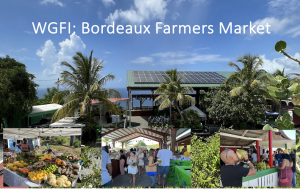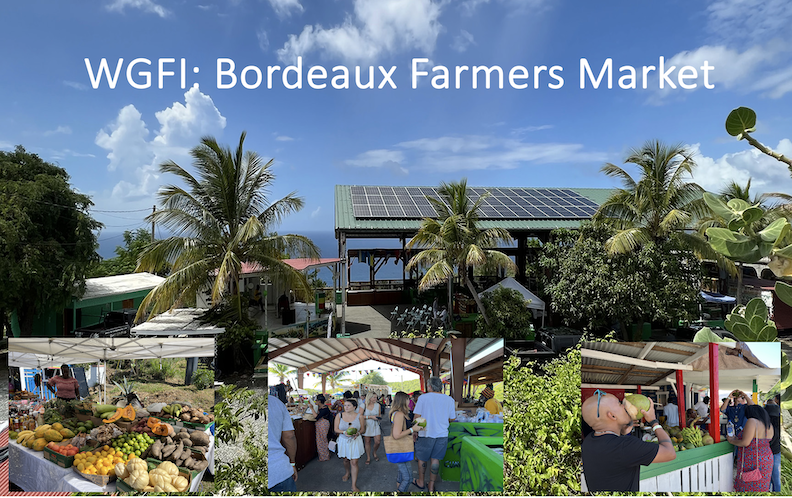by Ariel Miller, ESRAG Newsletter Editor

Doug White’s collage of photos from the newly-solarized farmers’ market
One of the major challenges to human food security is that a third of the food we raise ends up spoiling or being thrown away before anyone can eat it. The environmental impact is equally huge, generating one third of human caused greenhouse gas emissions throughout the life cycle from field to landfill. In that context, heartfelt congratulations to the Rotary Club of St. Thomas East Eco for their global grant project (GG 2231282) that provided solar power, back-up batteries, and a walk-in cooler to a non-profit farmers’ co-op on the Caribbean Island of St. Thomas, US Virgin Islands.
The Bordeaux Farmers Market, whose members are organic farmers, now operates completely off the grid! This is a huge economic boon to the producers, members of the non-profit We Grow Food, Inc (WGFI). They previously endured the double burden of electric costs twice the US average, plus the island’s extremely fragile grid subject to frequent blackouts, which further oppress the community with the financial losses from spoiled food. With on-site solar, batteries, and the cooler, the farmers can now keep produce fresh longer, make more money, and provide more food to the community.
The project also illustrates the growing value of ESRAG as a network. All of the international Rotary Club partners found out about it from members

Project partners happily posing in front of the walk-in cooler: L to R: Doug White, Rotary St. Thomas East Eco, Host Club; Eldridge Thomas, President WGFI; Benita Martin, Grant Manager, WGFI; Dee Brown, President, CFVI; Brian Marinelli, CEO, Silver Sun Solar. Photo: Rotary Club of St. Thomas East Eco.
who served on ESRAG teams: the Climate, Plant Rich Diet, and Food Waste Task Forces. Hats off to the Rotary Clubs of Ann Arbor North, Michigan, Toledo, Ohio, Boise, Idaho, and Hanalei Bay Hawaii, as well as Districts 7020, 6380, 6600, and 5400, and ESRAG’s Eastern North America Chapter.
Here are the benefits, which Rotarians can replicate in other communities.
- Clean energy: by going off-grid, the Market will prevent 333 tons of CO2 emissions over 20 years
- Disaster resilience: the rooftop solar and battery backup protect vendors from the island’s frequent power outages and hurricanes
- Greater income for farmers, whose co-op is now free from electric bills and who can now sell food that previously spoiled. Access to solar power will save them an estimated $259,570 over 25 years.
- Energy equity and climate justice: by raising the funds for the capital costs of the solar installation and winning the donation of the walk-in cooler, Rotarians and their community partners overcame the major hurdle to getting clean, free electricity.
The vegan, organic market stimulates community economic development and reduces the island’s carbon footprint by giving residents more access to locally-grown organic food and plant-rich options, better for their health and a major climate solution as well.
To find out more about how to work with your community to develop a similar project, contact Rotary Club of St. Thomas East Eco member Doug White at dougkwhite@gmail.com
